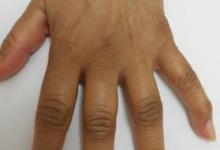The Medical History – Pitfalls and Preferences Save

I am easily frustrated with medical history taking. The high-pressured legal inquisitor approach to extracting the facts from an unwilling, unknowing patient is often inaccurate and not well received. And the laid back listener approach usually leaves me waiting and wanting the patient to reveal themselves to me – more expediently than their own due time. Practicing somewhere in between leaves me unsatisfied with patient histories that don’t flow easily and read like the textbooks say they should.
Thirty years of practice has taught me that it is a blessing and not a curse when the new patient consult shows up without any records, labs, results or prior consultative notes.
I will request past documents, but will not get apoplectic when the patient arrives without their “papers”. I don’t need no stinking papers because:
- Most notes/histories/EMR print-outs are illegible, too long, full of redundant useless info or devoid of any thought or explanation of a diagnosis or treatment.
- Medical histories are often incomplete with dates that can best be described as “scatter-shooting”.
- The rheumatologic diagnoses are invariably inaccurate to grossly wrong.
- MSK exam details have far more detail on the heart and lung exam, than the MSK exam.
- I would rather make my own CLINICAL judgements without the potential influence of someone else’s expertise, bias, inadequacies or magical thinking.
Clinical skills beat the medical record every day and are the basis of superior clinical acumen.
Seldom will prior notes or a stack of labs be critically important in establishing or confirming a new diagnosis.
We all know that a good medical history is the root and source of greater than 75% of all diagnoses.
So how do I manage my frustrations and obsessions vs. neglect over historic medical information?
First, I have to recognize the limitations of memory and patient recall. Second, I refocus my efforts on historic factors that have high predictive value and avoid time consuming worm-holes in history taking that have low predictive value. Lastly, by being focused and freeing up time – I now have time to listen to the patient.
Limitations of Memory & Recall
Malcolm Gladwell, the best-selling author and sociologist, has a podcast called “Revisionist History” (can be found on iTunes and Stitcher). I would suggest you listen to a great podcast on human memory –the episode is called, “Free Brian Williams”. He discusses why memory is over-rated, changes with time and is totally fallible. (http://bit.ly/2Leusad). The big takeaway from this expose is that even with tremendously history moments (called “flashbulb events”) the majority of us will change our stories by as much as 60% over time. Examples of flashbulb events include, where were you and what do you recall when:
- John F. Kennedy was assassinated
- John Lennon died
- Barack Obama was elected
- 9-11 attack on the World Trade Centers occurred.
While most of us have strong recollections of these events, research has shown that our vivid opinions are often rooted in ever-changing inaccuracies.
Now consider our patients and the medical history – either as written our respected colleagues or as recalled and reported by our beloved patients. These too will be laden with inaccuracies as reported.
The medical literature on historic recall often reveals the same level of inaccuracy (http://bit.ly/2OhYR5t).
Dr. Hal Paulus looked at 186 early RA patients who completed a self-reported mailed questionnaire every 6 months for up to 5 years. At each survey point they were asked to recall their RA symptom-onset date. A year after symptom onset, only 61% of patients recalled the symptom-onset date (within 1 mo.) they had reported at baseline. This decreased to 39% at 31 months and 25% at 70 months. Roughly 20% overestimated the duration of their RA, and the proportion underestimating it increased from 23% at 13 months to 50% after 56 months. Patients with longer disease duration, less disease activity, and higher pain levels tended to be less accurate; meaning the longer we cared for them and treated them to lower activity the more accurate their historic recall. (http://bit.ly/2OhHotR)
The problem with memory and medical history recall is that:
- It changes over time - The longer the patient is from the “history”, the more inaccurate and irrelevant that history becomes.
- It becomes less reliable with an aging subject
- It can be greatly affected by patient pain, mental distress and disease status
Key: Recognize that it is not all that important to get the patient to recant the events of a disease onset 11 months or 11 years ago. Recognize that its best be sure about what is currently in evidence and very recent events leading up to the presentation.
Focus on High Yield Historic Elements
This basically boils down to what elements of the history have the best yield in making an accurate and timely diagnosis. The table below is my relative comparison of high and low yield historic items. High yield means that these elements frequently factor into the diagnosis and treatment. Low yield means that these elements (albeit historic in importance) are either imprecise or have low predictive value to them. For example, family history is seldom important in establishing the diagnosis of arthritis or autoimmune disease. Most people believe it’s their genes (and family) that caused their arthritis; but rarely is this the case.
There are other perfunctory elements of the medical history that can be collected as part of a screening questionnaire that will, at times, have significant diagnostic value. You may disagree with some of my classification of elements. However, I’m certain that if you spend an equal amount of effort on all of these you will be wasting your time.
|
High Yield Elements |
Low Yield Elements |
|
Age/Race/Sex |
Morning Stiffness |
|
Symptom Duration |
Swelling or not |
|
Acute vs. Chronic |
Sequence of events |
|
Abrupt vs. Insidious |
Family History |
|
Focal or Monarticular |
Travel History |
|
Widespread or polyarticular |
Social history |
|
Pain and Erythema |
Allergies |
|
ROS; Systemic Features |
Prior rheumatologist visits |
|
Sleep Problems |
Prior notes or labs |
|
Intercurrent Illness |
Reports from family |
|
Response to Prior Treatment |
PCP diagnoses |
Listening
Listening still is the key to being a great physician (http://rheumnow.com/blog/time-listen).
Osler was right when he said “listen to the patient, she’s telling you the diagnosis”. (http://bit.ly/2JUxz1f)
This exercise is meant to challenge how you consider and approach your history taking. Should be modifying or cutting corners to make your history taking more efficient and equally accurate?










If you are a health practitioner, you may Login/Register to comment.
Due to the nature of these comment forums, only health practitioners are allowed to comment at this time.